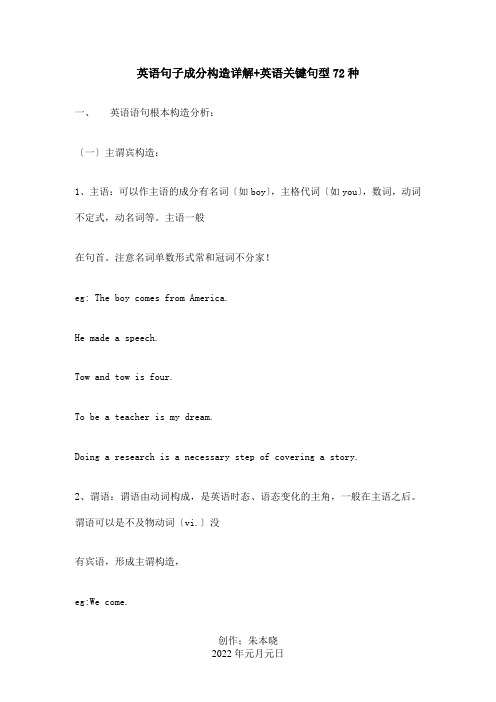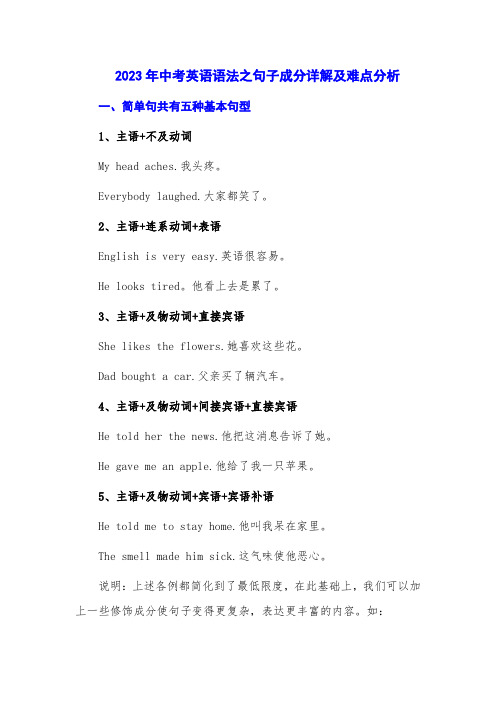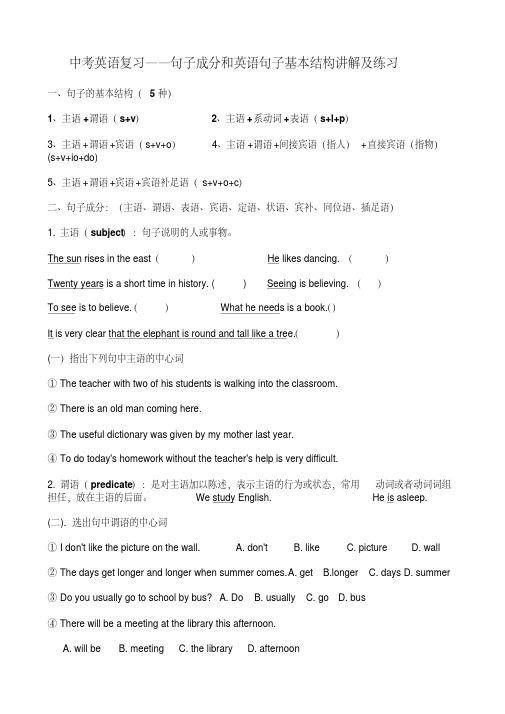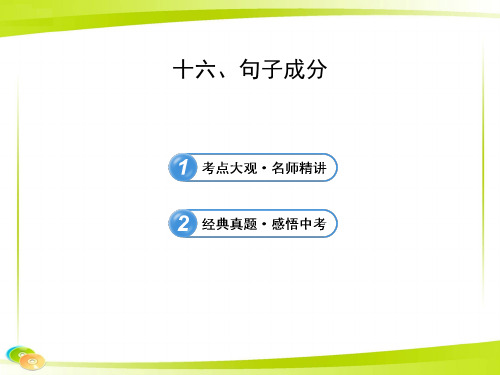中考英语句子成分讲解
(完整word版)中考英语语法重点:句子成分、基本句、状语、宾语、定语从句、it

一、句子成分:1.主语:主语(Subject)是一个句子所叙述的主体,一般位于句首。
主语可由名词、代词、数词、不定式、动名词、名词化的形容词和主语从句等表示。
例如:The sun rises in the east。
(名词)He likes dancing. (代词)Twenty years is a short time in history。
(数词)Seeing is believing. (动名词)To see is to believe. (不定式)What he needs is a book. (主语从句)2. 谓语谓语 (Predicate) 说明主语所做的动作或具有的特征和状态。
动词在句中作谓语,一般放在主语之后。
谓语的构成如下:1、简单谓语:由一个动词或动词短语构成。
如:He practices running every morning。
The plane took off at ten o'clock。
2、复合谓语:(1)由情态动词或其他助动词加动词原形构成,或由各种时态构成。
如:You may keep the book for two weeks.He has caught a bad cold.(2)由系动词加表语构成。
如:We are students.注意:谓语与主语在人称与数方面要保持一致3.表语表语(Predicative)用以说明主语的性质、特征、状态与身份,它一般位于系动词(如be, become, get, look, grow, turn, seem等)之后.例如:He is a teacher。
注意:系动词(Linking verb)用于连接主语和表语,说明主语的状态,性质特征和身份等常见的系动词有: be, sound(听起来), look(看起来), feel(摸起来),smell(闻起来),taste(尝、吃起来), remain(保持,仍是), feel(感觉)….It sounds a good idea。
中考英语句子成分结构详解英语关键句型72种试题

英语句子成分构造详解+英语关键句型72种一、英语语句根本构造分析:〔一〕主谓宾构造:1、主语:可以作主语的成分有名词〔如boy〕,主格代词〔如you〕,数词,动词不定式,动名词等。
主语一般在句首。
注意名词单数形式常和冠词不分家!eg: The boy comes from America.He made a speech.Tow and tow is four.To be a teacher is my dream.Doing a research is a necessary step of covering a story.2、谓语:谓语由动词构成,是英语时态、语态变化的主角,一般在主语之后。
谓语可以是不及物动词〔vi.〕没有宾语,形成主谓构造,eg:We come.Many changes took place in my home town.注〔以下这些词是不及物动词:表发生、出现的,如:take place, appear, happen, break out; 表来、去,如:come, go 等〕3、宾语:宾语位于及物动词之后,一般同主语构成一样,不同的是构成宾语的代词必须是‘代词宾格’,如:me,him,them等。
除了代词宾格可以作宾语外,名词,动名词,不定式等可以作宾语。
eg:I will do it tomorrow.The boy needs a pen.I like swimming.I like to swim this afternoon.〔二〕主系表构造:1、主语:同‘主谓宾’构造。
2、谓语:联络动词〔Link verb):be动词〔am,is,are,was,were,have been);其他联络动词如:become成为,turn变成,go变和感官动词如:feel, touch, hear, see等。
其特点是联络动词与其后的表语没有动宾关系,表语多为形容词或者副词,既,不可能是宾语。
2023年中考英语写作之句子成分课件

宾语 哪些词经常作宾语?
类别 1.名词
例句 I bought a computer last week.
2.代词
We all like her.
3.不定式
Remember to call me.
4.动名词
Would you mind opening the door?
5.名词化的形容词 We should help the poor.
简单谓语动词:由实义动词或实义动词词组充当。 • I saw him yesterday. • I look after my baby daughter. 复合谓语动词:主要包括三种:情态动词+动词原形、助动 词+动词的某种形式、系动词+表语 • I can speak English well.(情+动) • I am writing now.(助+动) • Tom has gone to Beijing.(助+动) • My baby daughter is cute.(系+表) • The cake tastes good.(系+表)
找出谓语 ① She decided to leave home. ② The man plans to go fishing tomorrow morning. ③ I will show you a photo. ④ The president elected yesterday is giving a speech. ⑤ The girl waiting out of the door is my sister.
定语 修饰限定名词或代词,即修饰主语/宾语/表语/宾补。
前置定语 放在被修饰词前面
中考英语语法之句子成分详解及难点分析

2023年中考英语语法之句子成分详解及难点分析一、简单句共有五种基本句型1、主语+不及动词My head aches.我头疼。
Everybody laughed.大家都笑了。
2、主语+连系动词+表语English is very easy.英语很容易。
He looks tired。
他看上去是累了。
3、主语+及物动词+直接宾语She likes the flowers.她喜欢这些花。
Dad bought a car.父亲买了辆汽车。
4、主语+及物动词+间接宾语+直接宾语He told her the news.他把这消息告诉了她。
He gave me an apple.他给了我一只苹果。
5、主语+及物动词+宾语+宾语补语He told me to stay home.他叫我呆在家里。
The smell made him sick.这气味使他恶心。
说明:上述各例都简化到了最低限度,在此基础上,我们可以加上一些修饰成分使句子变得更复杂,表达更丰富的内容。
如:In fact, English is very easy to teach.事实上,英语很容易教。
She likes the flowers very much.她非常喜欢这些花。
He told her the news on the home.他把回家的路上这消息告诉了她。
二、哪些词在句中不担任句子成分一般说来,虚词在句中不能单独担任句子成分。
1、冠词:置于名词之前The boss and his secretary are flying to Paris.老板和他的秘书正飞往巴黎。
It was an greement the details of which could not be altered.这是一项其细节不可更改的协定。
Her birthday is next Monday, so I must buy hera present. 她的生日就在下星期一,所以我必须给她买一件礼物。
中考英语复习——句子成分和英语句子基本结构讲解+练习

中考英语复习——句子成分和英语句子基本结构讲解及练习一、句子的基本结构(5种)1、主语+谓语(s+v)2、主语+系动词+表语(s+l+p)3、主语+谓语+宾语(s+v+o)4、主语+谓语+间接宾语(指人)+直接宾语(指物)(s+v+io+do)5、主语+谓语+宾语+宾语补足语(s+v+o+c)二、句子成分:(主语、谓语、表语、宾语、定语、状语、宾补、同位语、插足语)1. 主语(subject):句子说明的人或事物。
The sun rises in the east ()He likes dancing. ()Twenty years is a short time in history. ( ) Seeing is believing. ()To see is to believe.()What he needs is a book.()It is very clear that the elephant is round and tall like a tree.()(一)指出下列句中主语的中心词① The teacher with two of his students is walking into the classroom.② There is an old man coming here.③ The useful dictionary was given by my mother last year.④ To do today's homework without the teacher's help is very difficult.2. 谓语(predicate):是对主语加以陈述,表示主语的行为或状态,常用动词或者动词词组担任,放在主语的后面。
We study English. He is asleep.(二). 选出句中谓语的中心词① I don't like the picture on the wall. A. don't B. like C. picture D. wall② The days get longer and longer when summer comes. A. get B.longer C. days D. summer③ Do you usually go to school by bus? A. Do B. usually C. go D. bus④ There will be a meeting at the library this afternoon.A. will beB. meetingC. the libraryD. afternoon⑤ Did the twins have porridge for their breakfast? A. Did B. twins C. have D. breakfast3. 表语(predicative):系动词之后的成分,表示主语的性质、状态和特征。
中考英语语法十六 句子成分

We must be off now. 现在我们必须得走了。
类别
例句
(5) 现 在 分 词 作 表 语 Time is pressing. (表示主语的特征) 时间紧迫。
(6) 过 去 分 词 作 表 语 The glasses are broken. (表示主语的状态) 这些玻璃杯碎了。
类别
例句
(1)简单谓语:由一个动 词或动词短语构成,有 人称、数和时态的变化
Mr. Brown came to China last year. 布朗先生去年来的中国。
(2)由“连系动词+表语” The song sounds beautiful.
构成的复合谓语
这首歌听起来非常优美。
(3)由“情态动词+动词 Ann can sing very well. 原形”构成的复合谓语 安唱歌非常好。
There are fifty students in our class. 我 们班有五十名学生。
(7) 不 定 式 作 后 置 定 I have something important to do. 我有
语
重要的事情要做。
种类
例句
(8)动名词作定语 (9)分词作定语
We can swim in the swimming pool. 我们能在游泳池里游泳。
足语
我打算把墙漆成粉红色。
(3) 介 词 短 语 作 宾 语 Please make yourself at home.
补足语
请随便点儿。
类别
例句
(4) 副 词 作 宾 语 补 足 语
Let him in, please. 请让他进来。
第十五章句子的成分(思维导图+知识梳理+好题精炼)2022-2023初中英语中考语法归纳

第十五章句子的成分思维导图知识梳理一、句子成分概说句子的各个组成部分,叫做句子成分.英语的句子成分有:主语、谓语、表语、宾语、定语、状语、宾语补足语等.此外有些句子还带有呼唤语、感叹语、插入语,它们在句法上与句子的其他成分不发生关系,叫做独立成分.句子的成分一般由实词担任.实词有名词、代词、形容词、数词、动词和副词.虚词在句子中只起辅助和联系作用,不能做句子成分.虚词有冠词、介词、连词、助动词等.二、句子成分(一)主语主语是一句话的主题,是说话人要说明的对象,表示所谈的是“谁”或是“什么”.主语一般在谓语之前.英语里可担任主语的有名词、代词、数词、名词化的形容词、不定式(短语)、-ing分词(短语)、从句等.Beijing is the capital of China.北京是中国的首都.(名词作主语)They have lived in Beijing since 2019.自2019年以来,他们就住在北京.(代词作主语)Ten is a very important number.10是一个重要数字.(数词作主语)The rich are getting richer and the poor are getting poorer. 富者愈富,贫者愈贫.(名词化的形容词作主语) To read in the sun is bad for your eyes.太阳下看书对你的眼睛不好.(不定式“短语”作主语)Smoking is bad for you.吸烟对你有害.(-ing分词作主语)Whenever you are ready will be fine.你不论什么时候准备好都行.(从句作主语)(二)谓语1.概说谓语是说明主语“做什么”“是什么”或者“怎么样”.谓语(谓语部分里主要的词)用动词.动词常分为实义动词、连系动词、情态动词以及助动词.情态动词和助动词不能单独充当谓语,它们必须和实义动词或系动词一起构成谓语.实义动词包括及物动词和不及物动词,及物动词后面要带宾语.通常情况下,谓语位于主语之后.谓语和主语在“人称”和“数”两方面必须一致.谓语有简单谓语和复合谓语之分.(1)简单谓语.简单谓语由一个动词或短语动词构成.它有时态、语态、语气等.She likes drawing.她喜欢画画.I had finished my homework before 9 o'clock.在9点前我已完成我的家庭作业.(2)复合谓语.①由“连系动词+表语”构成复合谓语.The game is very boring.这场比赛真没劲.②由“情态动词+动词原形”构成复合谓语.She can swim very fast.她游泳游得很快.2.谓语和主语的一致一个句子的谓语动词与主语必须在人称和数上保持一致,规则如下:(1)主语是单数必须跟单数形式的动词,主语是复数必须跟复数形式的动词.He is a friend of mine.他是我的一个朋友.(2)两个或两个以上的单数名词由and连接起来作并列主语时,谓语动词用复数.You,he and I arr all students.我、你和他都是学生.He and I like green tea.我和他都喜欢绿茶.点拨(1)用and连接的两个名词如果表示一个整体,谓语动词仍用单数形式.Bacon and eggs was served.火腿和蛋端了上来.Fork and knife was used instead of chopsticks.用刀叉而不是用筷子.(2)有every或each修饰的单数名词并列时,谓语动词用单数形式.第二个every或each可省略.Every hour and(every)minute is important.每一小时,每一分钟都很重要.Each man and(each)woman has a seat.每位男士和女士都就座了.(3)主语是单数,后面有其他干扰的成分如with,together with,along with,aswell as,no less than,like,but,except等短语时,仍和单数形式的谓语动词连用.The teacher,as well as the pupils,is doing morning exercises.老师和学生在做早操.A woman with a baby is coming to the hospital.一个妇女抱着一个婴儿正向医院走来.(4)当两个主语由or,either...or,neither...nor或not only...but also等连接时,谓语动词应和最邻近的主语一致.His parents or his sister often helps him.要么是他父母要么是他姐姐(妹妹)常帮助他.Either Tim or hs brothers have to tidy the room.不是蒂姆,就得是他的兄弟们去打扫房间.Neither the teacher nor the students know the answer.老师和学生都不知道答案.Not only the pupils but also the teacher is going to the cinema.不但学生们,而且连老师也要去看电影.(5)有些集体名词,如:people,police,youth,cattle等用作主语时,谓语动词用复数形式.The police are looking for the missing child.警察在寻找失踪的儿童.People standing there are talking about the bad news.站在那边的人正在议论那个坏消息.Catle arr also kept.还养牛.点拨但people作“民族”解时,作单数用.The Chinese people is a great people.中华民族是一个伟大的民族.(6)有些名词以“s”结尾,但却是单数.如:news,physics,maths,politics等.所以谓语动词应用单数形式.What's the news?这消息是什么?Physics is not very easy to learn.物理不很容易学.Maths is not easy to learn.数学不容易学.(7)在由here和there引起的句子中,如有两个或两个以上的主语,谓语动词通常和最邻近be的那个名词一致.Here are some envelopes and paper for you.这儿有几个信封和纸给你.There is a pen and three books on the desk.书桌上有一支钢笔,三本书.(8)集体名词作主语时,如作为整体看待,谓语动词用单数;如作为个体看待,则用复数.这类集体名词有audience(观众,听众),class(班级),committee(委员会),couple(夫妇),family(家庭),government(政府),group(小组),team(队),army(部队)等.My family is a small one.我的家庭是个小家庭.My family are listening to the radio.我家里人正在听广播.(9)each和由some,any,no,every构成的复合代词,在意义上属于单数.它们作主语时,谓语动词用单数形式.Each day is better than the one before.一天比一天好.Every student must be here on time.每个学生必须按时到这里来.(10)Chinese,French,English,Japanese等名词作主语表示语言时,用单数动词;表示人时,用复数动词.English is spoken in many countries.许许多国家讲英语.The Chinese are very friendly.中国人很友好.(11)表示时间、重量、价值、长度、距离等的复数名词作主语时,把它视作一个整体,谓语动词用单数形式.Fifty years is not a short period.50年并不是一个短时期.Twenty miles is a long way to walk.走二十英里路可是很长的一段路程.(12)a number of与the number of作主语.“a number of+复数可数名词”表示“一些”“许多”的意思,谓语动词用复数;“t he number of+复数可数名词”表示“······的数目、数量”,谓语动词用单数.A number of books are missing from the library.图书馆丢了许多书.The number of workers in this factory is increasing.这家工厂的工人数目正在增加.(三)表语是指跟在连系动词be,seem,look,sound,feel,get,smell,become等词后面的词语或从句,用以说明主语的身份、特征和状态.由名词、代词、形容词、数词、副词、动词不定式、介词短语、-ing分词、过去分词(短语)、从句等充当.You are a student.I am a student,too.你是学生,我也是学生.(名词作表语)-Who is it?是谁呀?-It's me/I.是我.(代词作表语)当人称代词作表语时,在口语中常用宾格,在正式文体中用主格.The girl is quite pretty.这个姑娘长得相当漂亮.(形容词作表语)Five plus seven is twelve.5加7是12.(数词作表语)The meeting is over.会议结束了.(副词作表语)My books are on the desk.我的书在书桌上.(介词短语作表语)My wish is to be an artist.我的愿望是成为一名艺术家.(动词不定式短语作表语)What he likes is reading novels.他的喜好是读小说.(-ing分词短语作表语)Are you excited about your new job?你对你的新工作感到高兴吗?(过去分词作表语)The question is what we should do first.问题是我们先干什么.(从句作表语)(四)宾语1.直接宾语宾语表示动作的对象或行为的承受者,用在及物动词或相当于及物动词的短语动词之后.可以作宾语的有名词、代词、数词、不定式(短语)、名词化的形容词、-ing分词(短语)、从句等.(1)名词作宾语.She is playing the piano now.她正在弹钢琴.Please open the door.请把门打开.(2)代词作宾语.She often helps us with our study.她常常帮助我们学习.We should keep these in mind.我们应该记住这些.(3)数词作宾语.I can give two.我可以给两个.I like the first.我喜欢第一个.(4)不定式(短语)作宾语.He tried to catch up with his dassmates.他设法赶上他的同学.I hate to sing.我不喜欢唱歌.(5)名词化的形容词作宾语.We should respect the old.我们应尊敬老人.The scientists may find out the unknown.科学家们可以发现未知的事物.(6)-ing分词(短语)作宾语.Return the book to the library as soon as you finish reading it.你一看完这本书就还回图书馆.He enjoys wvatching TV plays.他喜欢看电视剧.(7)从句作宾语.She said that she was busy.她说她很忙.The mother asked how her daughter was.母亲问她的女儿身体如何.2.间接宾语在英语中,有些及物动词,如bring,give,send,show,tell,teach,lend,pass等,可以有两个宾语,一个指人,一个指物,指人的叫做间接宾语,指物的叫做直接宾语,间接宾语一般放在直接宾语之前.Can you give me any information on this matter?你能给我提供这些事的任何信息吗?Write me a letter every month,please.请每月给我写封信.Please make her a model plane.请给她做个飞机模型.有时,也可以在间接宾语之前加介词to或for,构成介词短语,并把这个短语放在直接宾语之后.Mother bought the handkerchieffor you, not for me.母亲是给你,而不是给我买的手帕.I took it to the policeman on duty.我把它交给了值勤的警察.(五)定语定语是修饰名词或代词的.定语有前置定语和后置定语之分.一般来说,形容词、代词、数词、名词或名词所有格等作定语时通常放在被修饰的词之前作前置定语;而副词、介词短语、不定式短语、-ing分词短语、-ed分词短语、从句作定语时通常放在被修饰的词之后作后置定语.He said he had an important meeting to attend.他说他有一个重要会议要出席.(形容词作前置定语)This is my friend,Li Da.这是我的朋友,李达.(代词作前置定语)When I sat down, a fourth man rose to speak.我坐下后第4个人又起来发言.(数词作前置定语)We should follow the doctor's advice.我们应该听医生的嘱咐.(名词所有格作前置定语)Who is the man over there?那边的男人是谁?(副词作后置定语)A college in London had agreed to take me.最后伦敦的一所院校同意接受我.(介词短语作后置定语)Can you give me some work to do?你能给我些活儿干吗?(不定式短语作后置定语)Who is the boy dancing over there?在那儿跳舞的少年是谁呀?(-ing分词短语作后置定语)There is a little difference between written English and spoken English.书面英语和口头英语有些不同.(过去分词词组作后置定语)I hate to see letters written in pencil.我讨厌看用铅笔写的信.(-ed分词短语作后置定语)The car that's parked outside is mine.停在外面的汽车是我的.(限制性从句作后置定语)Your car, which I noticed outside, has been hit by another one.我在外面看见你的汽车了,它被另一辆车撞了.(非限制性从句作后置定语)(六)状语1.状语的表现形式状语是修饰动词、形容词、副词以及全句的句子成分.可用作状语的有副词、名词、介词短语、不定式、-ing分词、从句等.This is even better than that.这个比那个更好.(副词作状语)The coat costs 40 dollars.这件上衣值40美元.(名词作状语)She will arrive on Monday.她将于星期一到达.(介词短语作状语)To kill bugs,spray the area regularly.为了杀死臭虫,这地方要经常喷洒.(不定式作状语)They entered the room,talking and laughing.他们又说又笑地走进房间.(-ing分词作状语)She has lived alone since her husband died.自丈夫去世后她一直独自生活.(从句作状语)2.状语的分类状语按照内容可以分为时间状语、地点状语、原因状语、目的状语、结果状语、条件状语、让步状语、方式状语、程度状语、频度状语、伴随状语.What were you doing at ten last night?昨晚十点钟你在干什么?(时间状语)I met Professor Wu at the library.我在图书馆遇见了吴教授.(地点状语)Having no money,he could not buy the TV set.因为没有钱,他不能买电视机.(原因状语)In order to get into a good school, he studies hard day and night.为了考入一个好的学校,他夜以继日地苦读.(目的状语)The wind blew with such force that people could harly stand up against it.风很大,人们几乎站不住.(结果状语)I can't do it without your help.没有你的帮助,我做不成这件事.(条件状语)Whatever/No matter what I said,he refused to go.不论我说什么他都不愿走.(让步状语)He knew the country around as he knewv his own house.他了解那儿的乡村一如他了解自己的房舍.(方式状语)They are now at breakfast, talking about the plan for their trip.他们正在吃早餐,谈论着旅行计划.(伴随状语)We are very busy.我们很忙.(程度状语)作频度状语的副词always,often,usually,seldom,ever,never等一般放在实义动词之前,连系动词之后.They can hardly stay at home alone.他们几乎不单独在家.(频度状语)They are always late for school.他们总是上学迟到.(频度状语)(七)宾语补足语英语中有些及物动词,除了要有一个直接宾语外,还要带上宾语补足语,句子的意思才能完整.宾语和宾语补足语(简称宾补)一起构成复合宾语,二者之间有逻辑上的主谓关系.可以作宾补的有形容词、副词、名词、不定式(短语)、-ing分词(短语)、-ed分词(短语)、介词短语等.I made the room beautiful.我把房子拾掇得漂漂亮亮的.(形容词作宾语补足语)Keep the lights on while you are out.你不在家时,请让灯开着.(副词作宾语补足语)They named the child John.他们给孩子取名约翰.(名词作宾语补足语)What do you want me to do?你希望我为你做些什么事?(不定式短语作宾语补足语)I saw him coming last night.我昨天晚上看见他来了.(-ing分词“短语”作宾语补足语)I had my watch mended in town.我在城里修的表.(叫别人修的表)(-ed分词“短语”作宾语补足语)You should put your things in order.你应该把你的东西摆整齐.(介词短语作宾语补足语)三、独立成分(一)呼唤语称呼人的用语,称为呼语.它可位于句首,也可位于句末或句中.Hurry up,children! or we'll be late.赶快吧,孩子们!否则我们要迟到了.Shylock,how can you hope for mercy yourself when you show none?夏洛克,如果你不宽恕别人,你自己怎能希望得到别人的宽恕呢?(二)感叹语感叹语表示喜怒哀乐等感情.它多位于句首,也可放在句中或句末.常用作感叹语的感叹词有:hello,oh,well,why,alas,ch等.Here!Don'tcry!好了!别哭了!Oh,what a beautiful garden this is!啊!这是多么美丽的花园!Well,well.Here's Jack.啊唷,杰克来了.Why,it is past noon.哎呀,已经过中午了.Ah!I have never heard of such things before!啊!我以前从未听说过这种事情!点拨(1)其他词类的词也可用作感叹词,表示突然的情绪.Fire! Fire! Water! Quick! The house is on fire.着火了!着火了!水!快!房子着火了!(2)yes和no在句子里也是一种独立成分.-Do yo know Tom?你认识汤姆吗?-Yes,I do是的,我认识.(三)插入语在叙事中途往往插入一些词语,对一句话作一些附加的解释.这类词语称为插入语.它可位于句首,句中或句尾.常用的插入语有:Ithink我想,I believe我相信,I suppose 我猜想,I must admit我必须承认,in my opinion 依我看,as far as I know 据我所知,as...is concerned 就······来说,to tell you the truth 说真的,to be frank 坦率地说,in other words 换句话说,after all毕竟,of course 当然,if you don't mind 如果你不介意的话,if I may say so 如果我可以这样说的话,等.By the way,do you know the young man's name?顺便问一下,你知道那个年轻人的名字吗?That's the cheapest suit we have,I'm afraid.恐怕那是我们最便宜的西服了.I say,let's go out for a drive next Sunday.我说,咱们下星期天开车出去兜兜风吧.To be frank, I don't think you are right.坦率地说,我认为你是错的.The cross-talk,I think,was both interesting and instructive.那个相声,我觉得既有趣又能教育人.Honestly,that is all the money I have.老实说,我所有的钱就是这些.好题精练一、从下列对话中划出独立成分1.Wife:First,we need money; second,we need another baby.Husband: Sad to say,I can't trust a woman any more.2.Tom:Fire!Be quick!Bob:Nonsense(胡说)!Tom,you are dreaming!Father:Silence! Mother is sleeping. Tom: No,mother is fighting the fire!Father: Oh, my poor Tom,what a dream you've got!答案:1.First;second; Sad to say2.Fire; Nonsense; Silence; No;Oh二、用动词的适当形式填空1.His family_________ (is,are) a happy one.2.The United States_________ (are,is) to the south of Canada.3.Fifty miles_________ (is,are)a long way to walk.4.Everyone_________ (think,thinks) they are right.5.Here_________ (is,are) the news.6.John andI_________ (work,works)together.7.There_________ (is,are) five pupils in the room.8.My class_________ (are,is)going to the park.9.French_________ (are,is) spoken in many countries.10.Neither James nor Tom_________ (was,were)at home.答案:1.is2.is3.is4.thinks5.is6.work7.are8.are9.is 10.was三、翻译下列句子1.我母亲是一位医生.___________________________________________________________________________________________ _2.天空变得越来越暗了.___________________________________________________________________________________________ _3.我们要使学校变得更美丽.___________________________________________________________________________________________ _4.我发觉那本书很有趣.___________________________________________________________________________________________ _5.别再弄出噪音了.___________________________________________________________________________________________ _6.你吃过午饭了吗?___________________________________________________________________________________________ _7.她给我买了一本词典.___________________________________________________________________________________________ _8.请递给我那张纸.___________________________________________________________________________________________ _答案:1.My mother is a doctor.2.The sky is becoming darker and darker.3.We'll make our school more beautiful.4.I find the book very interesting.5.Stop making a noise.6.Have you had lunch yet?7.She bought me a dictionary/ She bought a dictionary for me.8.Please pass me the paper.。
初中英语句子成分分析及五种基本句型

初中英语句子成分分析及五种基本句型- 主语:句子中执行动作或被动执行动作的人、动物或物体,通常作为句子的主体。
例如:"Peter runs every morning."(彼得每天早上跑步。
)这里的主语是"Peter"。
- 谓语:句子中的动词,表示主语进行的动作或状态。
例如:"They are playing soccer."(他们正在踢足球。
)这里的谓语是"are playing"。
- 宾语:句子中受动作影响的人、动物或物体,通常是动词的直接或间接对象。
例如:"She gave me a present."(她送给了我一个礼物。
)这里的宾语是"a present"。
- 定语:修饰名词或代词的词或词组,通常用来描述或限制名词或代词的特性。
例如:"The red car is mine."(那辆红色的车是我的。
)这里的定语是"red"。
- 状语:修饰动词、形容词、副词或整个句子的词或词组,用来说明动作、状态、方式、时间、地点、原因等。
例如:"He speaks English fluently."(他流利地说英语。
)这里的状语是"fluently"。
五种基本句型:初中英语中常见的五种基本句型包括:主谓句、主谓宾句、主谓表句、主系表句和疑问句。
1. 主谓句:由主语和谓语构成的句子。
例如:"The dog barks."(那只狗叫。
2. 主谓宾句:由主语、谓语和宾语构成的句子。
例如:"She readsa book."(她读一本书。
)3. 主谓表句:由主语、谓语和表语(通常是形容词或名词)构成的句子。
例如:"The cake tastes delicious."(这块蛋糕尝起来很美味。
- 1、下载文档前请自行甄别文档内容的完整性,平台不提供额外的编辑、内容补充、找答案等附加服务。
- 2、"仅部分预览"的文档,不可在线预览部分如存在完整性等问题,可反馈申请退款(可完整预览的文档不适用该条件!)。
- 3、如文档侵犯您的权益,请联系客服反馈,我们会尽快为您处理(人工客服工作时间:9:00-18:30)。
(五)定语 是修饰_名__词.单词作定语时通常放在它所修 饰的名词之_前____;短语和从句作定语时则放在它所修饰 的名词之__后___。
They are woman workers.
名词
Tom's father didn't write home until yesterday. 名词所有格
He sat in front of them ,his dusty face maski ng his age. All things considered,the trip wil l have to be called off.
Game (being) over,he went home. • He stands there,book (being) in hand. 独立结
Madj
The play has three acts.
数词
This is her first trip to Europe.
形容词 /序数词 /介词短语
China is a developing country.
现在分词 doing
I saw him going upstairs.
现在分词 doing
They found the house broken in. done 过去分词
宾语和宾语补足语一起构成动词的
复合结构
八)主语补足语 如果上述结构变成被动语态,原宾语成 为主语,原宾语补足语相应地变为主语补足语
I was elected captain of the team. Our country will be made strong. He died young. 他死时很年轻。(此句不是原宾 补变过来的)
My first idea was that you should hide your feelings.
句子
(四)宾语 表示动作的对象,是动作的承受者。宾语一
般放在___________之后。_____词后也会跟宾语。
动词/动词短语
介
She covered her face with her hands. 名词 n We haven't seen her for a long time. 代词 pron Do you mind opening the window? 动名词 Give me four please. 代词和数词 He wants to dream a nice dream.to do不定式 We need know what others are doing.句子 We should care more about our friends. 介词+名词 She felt it her duty to take good care of them.
I have nothing to eat.
to do 不定式
Those who want to go to Tibet are to sign their name
s here.
从句
六)状语 状语表示地点、时间、原因、目 的、结果、条件、让步、伴随情况等。
The best fish swim near the bottom. 地点状语
I left the village five years ago.
时间状语
I arrived late because of the traffic jam . 原因状语
We'll send a car to fetch you.
目的状语
The fish can eat a person in two minutes , leaving
They elected me captain of the team. 名词
We try to make our country strong. 形容词
We found everything in good order there.介词短语
I should advise you to get the chance. to do 不定式
– This is my cousin, Helen. • 这是我的表妹,海伦 • We students should study hard. / (students
是we的同位语,都是指同一批‘学生’) • We all are students. / (all是we的同位语,都
指同样的‘我们’)
• 1. We love China. • 2. She seems tired. • 3. He can speak English • 4. We have finished reading this book.
△情态动词和助动词不能单独充当谓语, 必须和实义动词或系动词一起构成谓语 .
They can speak English well. They are playing over there.
他开会时总保持沉默。
3)表像系动词,用来表示"看起来像"这一概念,主要
有seem, appear, look, 例如:
He looks tired. He seems (to be) very sad.
4)感官系动词,主要有feel, smell, sound, taste This flower smells very sweet.
5)变化系动词,表示主语变成什么样,主要有
become, grow, turn, fall, get, go, come
He became mad after that.
6)终止系动词,表示主语已终止动作,主要有
prove, turn out
The rumor proved false. 这谣言证实有假。 His plan turned out a success. 他的计划终于成功了。
十.
独立成分
感叹词、应答词、呼语、插入语 等,在句中可作独立成分,用逗号与 其他成分隔开。
Oh, my god!
感叹词
Come in, Mr Green.
呼语
This , I think, is the best way
to help them.
插入语
分词独立主格结构:
• 分词作状语时其逻辑主语与句子的主语一致! 否则 应有自己的逻辑主语,构成分词独立结构。
only bones
结果状语
The students came into the classroom, singing and
dancing.
伴随状语
If he goes, so will I .
条件状语
Though he is a child, he knows a lot. 让步状语
七)宾语补足语。英语有些及物动词,除了要有宾语之 外,还要加上宾语补足语,才能使句子的意义完整。
构还可用with、without引导,作状语或定语。 这种结构不但可以用分词,还可以用不定式、形 容词、介词短语、副词或名词等。 • 如: • With nothing to do,he fell asleep soon./无事 可做,他很快就睡着了。
• The teacher came in,with glasses on his nos e./老师进来了,戴着一付眼镜。(注意,此句o n his nose不可省略!)
则其逻辑主语就是句子的主语,既your score . 显然做study的应是人,不应是your score(分 数). 正确句(1)更正了句子的主语,使其与分词逻 辑主语一致( 同为you );正确句(2)则使用条件分句 带出study的主语,(不过已经不是分词结构了). 分 词独立结构常省略being,having been.不过‘The
系动词
1)状态系动词,用来表示主语状态,只有be
(a
m,is ,are,was,were,been,being)一词
He is a teacher.
2)持续系动词,用来表示主语继续或保持一种状况或
态度,主要有keep, remain, stay
He always kept silent at meeting.
二.五种简单句基本句型
二)谓语由__动__词_/_动_词__短__语__担任。助动词或情态动词加其他动 词的适当形式也构成谓语动词。
Action speaks louder than words.
The chance may never come again.
Mary has been working at the dress shop since 1994.
The match became very exciting. adj
The story of my life may be of help to others. 介词短语
Three times five is fifteen.
数词
His plan is to seek work in the city. to do不定式
句子成分与结构
英语的句子成分:
一) 主语:
Walls have ears.
名词
He will take you to the hospital. 代词
Three plus four equals seven. 数词
To see is to believe.
to do不定式
Smoking is not allowed in public places. doing动名词 Whether or not they will come depends on the weather. 句子
一、介绍与其重要性
